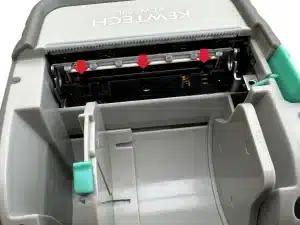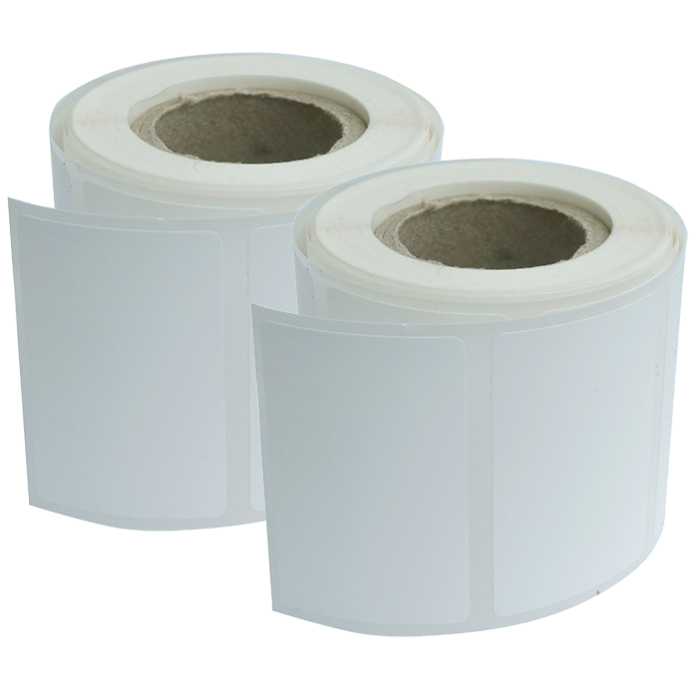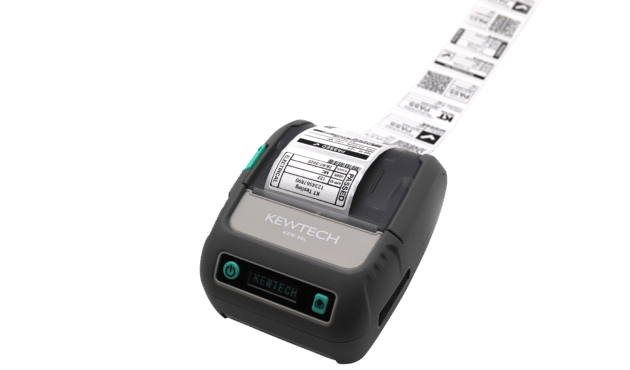If you own a KEW80L Label Printer with a Serial Number starting 221008 or higher, we recommend that you use the Larger 25mm Core Rolls which have around 275 labels. At the time of writing (21st Feb 2023) these currently have a Yellow Backing Paper, but this may change in future batches.
The recommended labels for the KEW80L are made from Polypropylene which gives additional durability and increased print quality when compared to standard paper labels.
There is however a trade-off when using Polypropylene Labels and Direct Thermal Transfer technology which is used in the KEW80L Printer. While it’s not all bad, it does require that regular cleaning of the Print Head is carried out, more on that below.
How does Direct Thermal Transfer Work?
Direct Thermal Transfer Printers do not require any form of ink, toner, wax or even a ribbon, printing is achieved by using heat applied to the Print Head, the magic happens via a chemical reaction on the label itself.
The Thermal Print Head has a matrix of very small dots, each of which can be heated individually at great speed. As the label passes over the Thermal Print Head, heat is transferred onto the Label which in turn reacts with a layer of paper which has been impregnated with dye. This is the chemical reaction mentioned above and in turn produces the final image on the label.
Getting the optimum print quality is a fine balance between label stock, heat, the speed in which the label passes over the print head and software.
In order to produce an image, the Label must come in contact with the print head and therein lies one of the trade-offs of using what is in effect a plastic coated label.
Residue on the Print Head
Over time the Print Head will accumulate residue from the Polypropylene Labels during the heat transfer process. This can also be compounded by the label adhesive (between the label and backing paper) also becoming heated up and seeping from the edges during heavy use in quick succession.
The build up of this sticky residue on the Print Head can be gradual, but increase rapidly if not removed. The amount and speed in which it builds up can vary between Label Stock (individual Rolls or batches) and possibly environmental excesses such as temperature.
If residue is left to build up you will normally experience Labels Sticking, Mechanical Grinding or a different tone in the Motor as it works harder to feed the labels through. Labels may also become miss-aligned and general print quality will be degraded.
While we do carry out high intensity testing on various printers from time to time, we don’t use these printers on a regular daily basis, so we are unable to offer any specific advice on how often you should clean the head, however I would certainly recommend every 3 rolls to begin with and take it from there.
Cleaning the Print Head
The print head is the Black plate just below the serrated cutters as you open the lid. It is attached to a metal plate which is spring loaded.

It is important that we clear any residue before it has the chance to impact further on Print Quality and additional stress on the hardware and to do this I personally use small pre-soaked Acetone wipes which you will find in the beauty industry for removing Nail Gel Coat or Nail Varnish etc, however I have also used liquid nail varnish remover out of the bottle with a suitable cloth.







